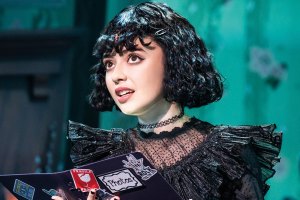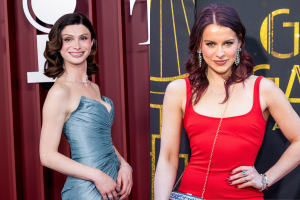I’d say that there have been two major influences. The first was the time I spent at the Drakensberg Boys Choir School in South Africa, which I joined when I was 11. I didn’t grow up in a musical house so my time at that school was my first exposure to classical music. During my four years there, I learned to love Mozart, Bach and Handel and was introduced to a number of great composers. I think that was where my love for classical music began. The second big influence was Professor Werner Nel, the Head of Music at Potch, my South African university. I went to university to study Law and took singing lessons with him as a hobby. His passion for lieder and opera was hugely inspiring. Through his wonderful teaching and encouragement I went on to do a music degree and subsequently came to the UK to pursue a singing career.

What made you want to pursue a career in opera?
I’m not sure that there was one thing in particular – in many ways I stumbled into it; auditioning for the Drakensberg Boys Choir as a dare between 11 year olds, a terrible tax exam that put me off the Law for good, a chance meeting with a South African friend studying at the Royal College of Music who suggested I audition for a place. One thing seemed to lead to another and amazingly I found myself singing principal roles at places like Covent Garden and Glyndebourne. I’m certainly more focused now in pursuing opera as a career. The challenge of consistently improving myself as a singer and performer, a love for certain roles, the excitement of discovering new music, the privilege of (hopefully) bringing some kind of beauty to people; these are all reasons why I’m incredibly thankful for this career.
If you had to single out three career-defining moments what would they be and why?
Having been awarded a place on the Jette Parker Young Artists programme at the Royal Opera House was the first big step in my career. This followed with the Cardiff Singer of the World competition in 2007; I remember watching the competition when I was back in South Africa and so the opportunity to represent my country at St David’s Hall was a real honour. It was a genuine surprise to win the Audience Prize – it was the first time I’d experienced that kind of public recognition and was very humbling. Singing Billy Budd at Glyndebourne in the 2010 Festival was career-defining. It was an amazing production which the audience seemed to love as much as those of us lucky enough to have been involved. There was a huge amount of pressure taking on the title role as a young singer, but the experience taught me a great deal about myself and what I can deal with as well as giving me amazing career exposure.
You are about to sing Billy Budd again – what is it about the role that you find so fascinating?
Billy’s music is beautiful and sympathetic, jubilant and uplifting, tender and heart-breaking. Britten has created through his music this character that you just have to love just by listening to his music. Add then the almost other worldly character who longs for goodness, justice, friendship and fairness to the point of death. His willingness to die for his Captain and mates, the strength he has and his admiration for Vere and the “goodness” he represents until his death creates a character which I would imagine anyone would aspire to or certainly admire. The flaw in his temper and his fateful stammer as well as his naive trust of Claggart makes for a well-rounded character which is a challenge and a privilege to portray. Singing Billy is a bit like having that friend you want to spend as much time as possible with who uplifts and inspires you to be better.
You were one of the Jette Parker Young Artists at The Royal Opera – what was that experience like and what did it teach you?
It was an incredible launch pad but more importantly a time of learning various things about being a singer. I had the privilege of singing with great like Jonas Kaufmann, Simon Keenlyside, Ferruccio Furlanetto. You learn so much from watching these singers and quite often we could arrange for coaching sessions with them or just pick their brains. You work with top coaches on a daily basis and you spend two years in a professional, friendly atmosphere. I couldn’t imagine a better base to start from. The most important lesson I learned there was to be a good colleague. Through various experiences in shows I was involved with I saw the difference in tensions, support and camaraderie which was present or lacking, and how it could affect not just the people involved but also the quality of performances.
What’s next on the horizon?
My wife is expecting our first baby in September and that is just about all I can think of at the moment as I am thrilled to be a father soon. After Billy Budd, I’m heading straight up to Glasgow to start rehearsals for a new production of Don Giovanni with Scottish Opera which Sir Thomas Allen is directing. It will be my first time singing the role and I’m very much looking forward to learning from him – one of the all-time greats, then the Glyndebourne production of Billy Budd in New York at the Brooklyn Academy followed by Valentine in Faust for Baden Baden in April. As far as long term goals are concerned I want to keep on improving technically as a singer. I am determined to be a great singer who can act rather than the other way around and I want to be cast because of my singing before anything else. Of course I want to be a rounded performer but the actual singing is so often the thing that falls behind and that is for me the most important aspect of an opera “singer”. This is not something I claim to have achieved but it is what I am working for.
You’re stranded on a desert island but are allowed one musical score – which would you take with you and why?
At the moment Pelléas et Mélisande. I sang Pelléas for the first time last autumn and fell in love with the piece. It’s such a unique sound world and a joy to sing. It feels a bit like a vocal massage singing it and it is a piece I want to sing a lot more. Ask me again in a few years, or probably months, and it might be something else. That is just the joy of our job – so much incredible music which grabs your mind and heart at different times.
Glyndebourne Festival Opera revives Michael Grandage‘s staging of Billy Budd from 10 August












